How To Watch --- Why To Watch
Take Your Titles or Dubbing Pick ...
I have a cousin who moved to Germany thirty years ago and he is still learning the language. So what’s chance of mastering Teutonic tongue however many runs of M or The Blue Angel I engage? We can endless argue dub v. subtitles, or agree going in that neither are wholly satisfactory. Thing is, one must choose, unless he/she moves bag and baggage to begin thirty years Deutsch tutelage. Maybe I have those many left, but fact Latin and Spanish went badly for me in high school yields faint promise. All this to grasp M beyond “Elsie … Elsie”? Creative solution is needed, and may-be I have at least a partial one. Miracle that is Blu-Ray allows us to toggle back-forth with subtitles, or without. Having memorized M like Catechism, I know what scenes are talk as opposed to visual. Trick then is to turn off subs when, for instance, chasing is on (Lorre hiding/underworld pursuing), keep titles where opposite camps argue strategy. On the other hand, where one knows M well enough, better still to just watch and recall for yourself what is spoken. Focus can rest upon cigars lit or snuffed out, crooks doing card tricks, examining contraband, as they wait or listen, body language exhibited through intercut conferences law and outlaws conduct. They say Fritz Lang really went to town on details of set decoration here, but how does one absorb with eyes ping-pongy from body of scenes to lower margin? What it needs is to “learn” M, and The Blue Angel, but that raises question as to how many foreign films are worthy to so retain, let alone repeat watch for what remaining years destiny gifts us (my hopeful 30 … and still writing Greenbriar?).
M and The Blue Angel had multiple language versions, separate shot, in M’s case with other directors to thin soup. I feel like Stanley after Livingstone turning over spoken rocks, quest to pick the more “legitimate.” A part of me feels unclean to prefer The Blue Angel in English, as few apparently do. I ran it once at ASU, telling the audience we would hear Paramount’s Yank-friendly import as released stateside 1930. You would think I had put rat poison in their popcorn, a chorus raised to demand we hear language as uttered in the Fadderland. But wait, kind audience … The Blue Angel was not dubbed. Those voices you hear are Jannings and Dietrich, and I for one do not find either inadequate in their delivery of English, whatever some writers claim. Background is preserved by those in support speaking mostly German. The device sort-of works by having Lola ask Prof. Rath to speak “my language” so she can understand, and since that is not his native tongue, Jannings/Rath goes about it awkward, which is entirely appropriate, given circumstance the drama has set up. I understand Lola was supposed to be American for the US Angel, so we may assume Rath’s students speak with her in English to accommodate that. We get a feeling most of this cast is bilingual, at the least getting by phonetically. How much of The Blue Angel’s crew/cast understood both tongues? Jo Sternberg did. He came of Euro origin (Vienna), made effort upon US arrival to eliminate any trace of accent (was Jo really five feet four in height?). I thought Dietrich did swell by both German and English, Jannings too, as he brought real understanding and expression to what was said to be a distinct second language for him.
So how many languages could Peter Lorre speak? I am abashed by citizen-of-the-worldness as embodied in he and others who could light anywhere, do exemplary work for whatever culture, be accessible to us all. Archivists lately found an English-language print of M. It had been lost for decades. There was a French edition floating about, from which we got Lorre speaking fluent. How on earth could you dub him? There is not a voice like Lorre’s in the memory of man. Alternate M’s are understood to be largely sans Lang, other hands filling in to direct French and English dialogue (was M furnished in yet more languages than these?). Nero Films, a frayed cuff outfit in best of times, had to sell M however they could in as many markets as it might travel. We of the US presumably got the English version, though there were also subtitled German prints on view from earliest stateside release. I’m guessing art housing or German neighborhoods opted for these. What Lorre saw, and slept through, at Wilshire’s Regina triple with The Black Room and White Zombie backing M, was likelier a dubbed-to-Yank print, the Regina a scratch house catering to the less discriminatory. Lang-less M’s, not altogether so, but enough to fade his signature, are not menu of choice today, but it is fascinating to compare Lorre doing his finish speech in German, French, then English, an option we now have thanks to energy of archives, plus effort of Criterion to offer varied options. Humbling still to hear Lorre cover three bases at such accomplished level. To see this great actor ply his multilingual trade makes me feel all a more like the hick I am.
The Blue Angel came of partnership between Germany’s Ufa and US Paramount, having done silents as a team (notably Metropolis), this a first talking venture between them. Notion to construct a star from raw material that was Marlene Dietrich came as result of seeing rushes of her Lola, a new Garbo the distinct possibility. Dietrich was brought to America, gaucheries smoothed out, her actual premiere on our shore to be Morocco, with The Blue Angel on its heels for holiday 1930 release. Angel looked Euro-crude (a good thing) beside better-oiled Morocco, but Broadway embraced Angel at its Rialto address and got, by Gotham standard, a solid hit to crush records set by Feet First and Animal Crackers of earlier that season. Here was a first exotic wedding between German and English languages, plus The Blue Angel had sex by ladle-full, Dietrich a fleshy thigh-treat audiences had not seen likes of since Pola Negri made domestic landfall. Emil Jannings was the nominal star, but this was final bow so far as his entertaining America first. “Selling The Blue Angel” as laid forth by Paramount merchandisers made “sensational flame-girl” Dietrich the priority, “having scaled a height in a few weeks that it has taken the greatest stars of the screen years to attain.” She was, as of final month of 1930, “one of the three most potent boxoffice draws in motion pictures,” so said studio boosters. Jannings meanwhile was “especially popular with critics, with customers of Central European origin or sympathies and with that portion of your audiences that can appreciate a superb artist.” Noted was Jannings being welcome “in big cities with cosmopolitan populations.”
Silents were the only truly universal language on film. We don’t feel that so much in the US for having had the best of talkie advantage, but think of markets worldwide that had to cope with crude dubbing, inexpert subtitling, loss of distinct voices our English-speaking players had. Ever listen to Edward G. Robinson or Boris Karloff dubbed? (we could name a hundred more). Real downer. I think of that Italo-Black Sabbath and how drably Karloff’s voice was covered. Result: Cannot bear to listen. Would M have worked as well, or better, as a silent? More accessible to many more people, yes, but consider what Lang wrought with his unique “sound design,” as complex or more than what had been achieved by US filmmakers. Imagine ideas that occurred to Fritz Lang, Rouben Mamoulian, and Lewis Milestone around a same time. Who could be credited with any “first” innovation where sound was concerned, what with most creative imaginations chasing a same rabbit? Lang made his smartest M moves with ambient sound, offscreen talk, cuts made sudden from one voice, to another someplace else, making them “rhyme” to unify separate scenes. French and English M’s lost much of this because Lang wasn’t there to guard his vision. But how fair was it to expect any director to shoot, re-shoot, shoot again, and make maximum effort of each? Wonder if Lang had occasion to sit through M in French or English. If so, he surely blanched.
To Josef von Sternberg came The Blue Angel as triumph to build upon Underworld and others of a Bancroft lot, collaboration with Dietrich a six-year annuity to protect Jo’s being fired for martinet (put it mild) behavior. He said a secret to success was making everyone hate you. Anyone here ever try it? The Bancrofts were fizzling by then, and Evelyn Brent was not going to work out, so Jo needed Dietrich perhaps more than she needed him. They had an affair while Angel was ongoing. Jo’s wife took the return to US boat alone and with legal reps heated up his later homecoming. The Blue Angel for all this was brilliant thanks to what Sternberg gave it, “every frame a painting” applying especial here. Subtitles weigh heavy on such artistry, and who needs them from a director for whom story was always secondary. The (German-spoke) Blue Angel playing ethnic enclaves from initial US release was per Paramount policy servicing diverse audiences with varied language versions the company produced in Europe, hundreds of talkies in work at their Joinville plant, located outside Paris to supply a show-world with whatever was needed by markets beyond an English-speaking mainstream. Joinville operated on a 24-hour schedule, films done in as many as fourteen different languages. “Foreign Version Films Swell Box-Office Draw” said Publix Opinion, Paramount’s house organ, on 12/26/30, “industrial centers” a key target, as these housed large ethnic populations. Perth Amboy, New Jersey had for instance a large “Hungarian element,” so they got Ufa-produced Melody of the Heart, spoken in native language, and performing well at venues catering to Hungarian patronage. “Biggest drawing cards of Paramount’s foreign versions,” said Para marketers, were French language (not dubbed) Slightly Scarlet, The Big Pond, and The Lady Lies. Portuguese and Polish editions were also well-received, Paramount’s outreach a most extensive in the industry.
Many theatres had two or more prints in the booth to service mixed populations, the number of runs for a foreign version depending on representation the respective group had in that city or neighborhood. A non-English version might alternate days through an engagement, or be used for a midnight show only, all depending on how much ethnic presence there was. “The local situation should invariably dictate the type of engagement,” said bookers, being careful “that the theatre incurs no risk of alienating its regular English-speaking patronage.” A wrinkle, or rankle, for exhibitors playing The Blue Angel was barest compatibility between prevailing Western Electric sound systems used in the US and Germany’s Klangfilm recording process. Specific instructions sent to showmen, as shown at left, amounted to dance upon heads of pins, a challenge among many for those projecting sound film in the late twenties. I have read of The Blue Angel not doing well after metropolitan runs. Could that have been result of venues lacking tech proficiency, or proper guidance, to supply playback folks could hear? We enjoy The Blue Angel with sound at highest digital standard, restored to levels topping what could be achieved for 1931 playdates. I lately watched both the German and English versions, juggling act as follows: Songs in German as composed by Frederic Hollander and lyricists … Dietrich for one preferred Deutsch words, was never happy having to sing, from there on, “Falling In Love Again” with English lyrics (she performed the song in German for much of live Euro appearances). I go with English for dialogue between Jannings and Dietrich, because for me they both deliver well, to a point where I regret Jannings not coming back to the US and sparing his legacy terrible damage for Reich-turn he later took in Germany. Subtitles are buzzing flies over Sternberg, clutter we don’t need to distract from clutter he splendidly uses to decorate, that we do want.
NY Times critic Bosley Crowther lit a fuse on 8/7/60, with a follow-up column later, wherein he said outright that “subtitles must go!”, this in a thick of art-housing and purists that attended them. Crowther surely knew he was flaming Gotham patronage, but had courage of convictions and stood by them. He called the English subtitle “a thoroughly inartistic thing when you come right down to thinking hard about it,” which I have, and yes, they are inartistic, plus distracting and not an enhance to what I’m watching. But what is the cure? Dubbing, says Crowther, “so skillfully accomplished and controlled, with voices matched so finely, and lips so deftly synchronized, that only the most expert observer can detect the lingual trickery.” Had such mastery of dubbing been achieved by 1960? (sure wasn't when I saw Rodan) Two Weeks In Another Town (1962) makes dubbing look doable (the “Kruger sound”), and when you look at Fritz Lang’s late-50’s Indian epic, with its mosaic of languages spoke … well, why not bring them under a better-understood umbrella? Crowther: “Anyhow, it is time we abandon the somewhat specious and even snobbish notion that foreign-language films (some of which have even been dubbed in their own language!) are linguistically inviolable. Let’s give the general audience a chance to hear what they are saying.” Crowther knew, as did those who distributed imports, that subtitles typically translated less than half of what was being said on screens, so what did that say about their authenticity? The outspoken critic got an expected drubbing … you’d think Crowther was forum-writing fifty years later online. Frog march off the Times for later daring to speak his mind re Bonnie and Clyde was a pink tea beside furor Crowther roused on this occasion. I admire the man for stepping off chalk lines, nourishment for thought by a critic maligned and reputation-wrecked since losing his desk in 1968. Arguments re subtitles/dubbing meanwhile continue. What foreign films I glimpse on stream basis appear to be mostly titled, or is dubbing so “skillfully accomplished and controlled” that I no longer notice it?
From Greenbriar's Archive circa 2014: M in America --- two parts.
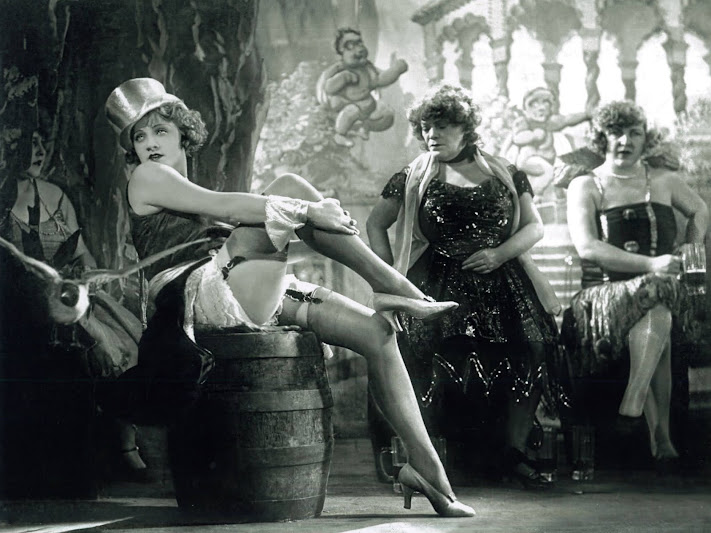




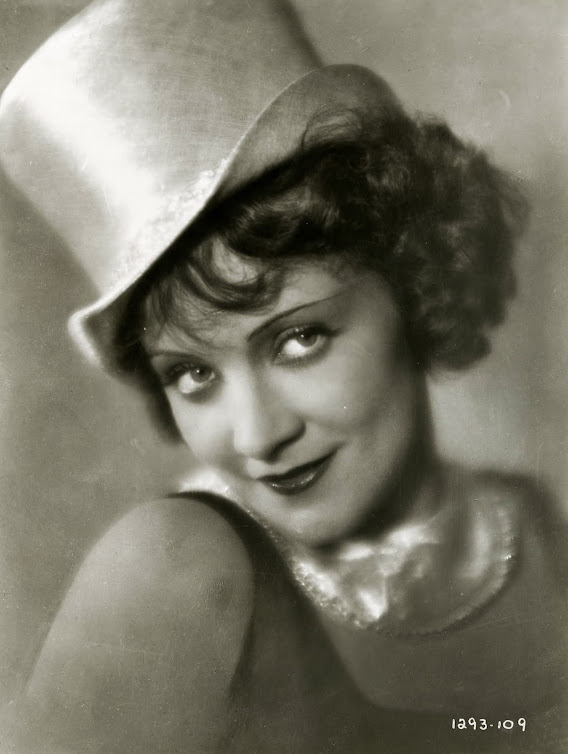


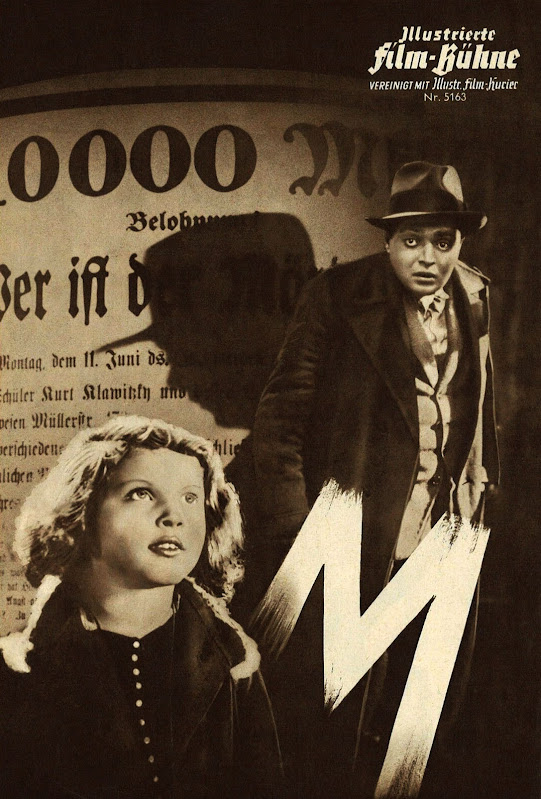
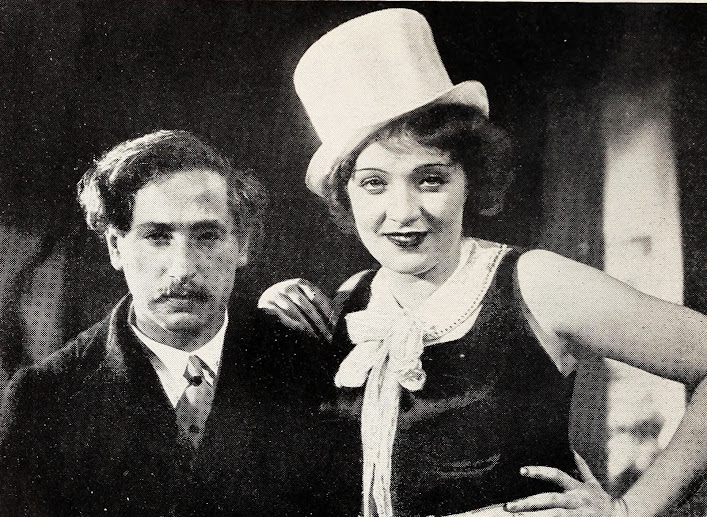












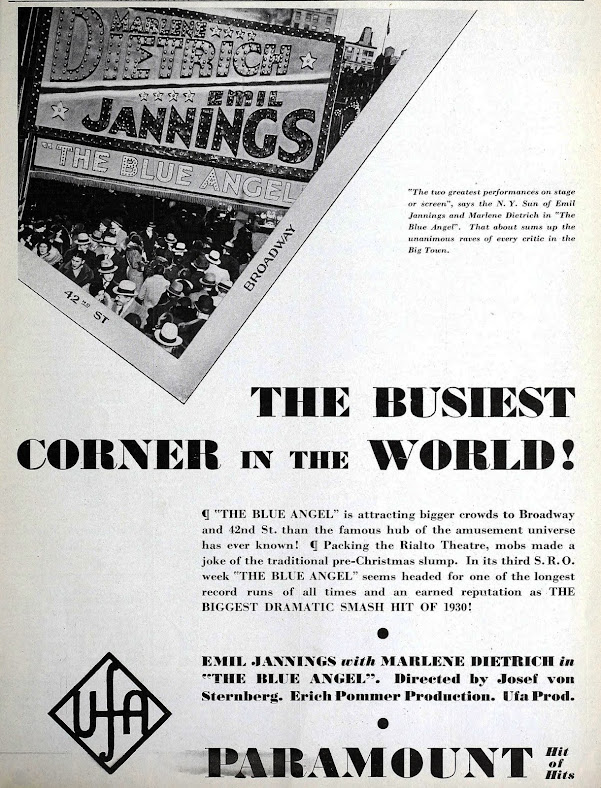
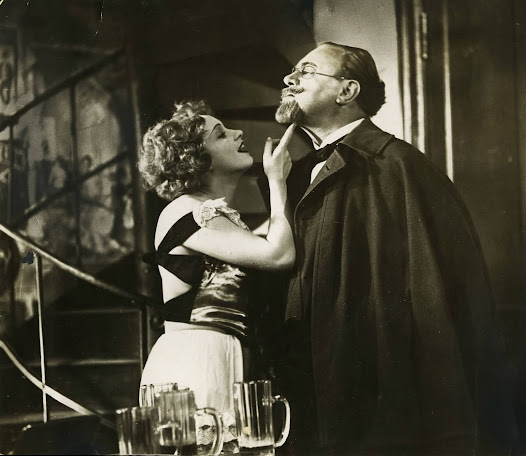
18 Comments:
I will take subtitles over dubbing any day. Prosody is "the rhythmic and intonational aspect of language" according to Merriam-Webster. Rhythm and tone communicate an awful lot, even if you don't understand the language. With subtitles, you get the prosody and the content, where with dubbing, you never know if the dubbed performance actually reflects what the actor did and whether the content has been altered to fit the pattern of the lips.
Watching Burt Lancaster in his films for Viscounti is disappointing due to the lack of his voice. When I watch Miyazaki films, I prefer subtitles if only to hear what the director intended in the performances.
The worst thing about dubbing is that it often ignores the ambience of the on-screen space. There's nothing worse than an outdoor long shot and the dubbing sounds like the performer was inches from the microphone.
Dubbing... I remember watching films like THE TWELVE GLADIATORS (I made this title up) with all 12 lined up and one speaking. Since the actor dubbing them was close to mike the volume was always the same and always centered. You had to look for lips moving.
A sidebar: is M the film where a basement full of men smoking cigars all but obliterate the air?
Does one person in a million remember once famous (and physically hefty) comedienne Trixie Friganza, vaudeville star?
Dubbing, to me, always sounds exactly like what it is, an actor in a sound booth reading dialogue; The more recent trend on DVD of yellow subtitles is miles ahead of dubbing, in my humble opinion.
Subtitles mean we read the movie instead of watching it. When I realized that I came to prefer even the worst dubbing. Books are meant to be read. Movies are meant to be watched. I agree about Karloff in "BLACK SABBATH." For such a unique and wonderful voice not to be used robs the film. Does Criterion have a new Blu-ray on these titles? Great pictures. Thanks.
Speaking of La Dietrich, Kino has just released her main pre-Blue Angel film, that she insisted didn't exist (because she claimed Blue Angel was her debut), 1929's The Woman One Longs For, directed by Curtis Bernhardt. It is well worth seeing one, because Dietrich is plainly Dietrich before Von Sternberg came along, and two, because it's a very fluid and well made melodrama. Well worth seeing.
I feel like an outsider reading your article as well as the comments.
Here in Austria/Germany (same copies) we have been force-fed dubbed movies for a long time. In Sweden, Finland, Norway, Denmark all movies and TV-shows are subtitled, one of the reasons why most of them speak very good English.
Czech Republic - on big screens, all Hollywood movies are subtitled, on TV the same movies are dubbed. In Switzerland the same but you can switch to English on TV.
Now it is much easier to avoid dubbed movies - just wait for the DVD or got to the many English-only movie theatres here in Vienna (not so much choice of course in smaller cities). With some movies and TV shows you can now choose between dubbing and English - not too many of them though.
I have refused to watch any dubbed movies for the last 30 years.I could tell you stories - for instance, Cary Grant, Fred Astaire and Gene Kelly speaking with the same dubbing voice. Or, worst of all, in some musicals from the 50s they even dubbed the songs!
Subtitles all the way for me - "The Munsters" was one of the few TV-shows with subtitles when I was a kid. We still found it hilarious and learned some English on the side...
The very first dubbed film was Paul Fejos' BROADWAY. The reception of that version was an absolute disaster in all countries in which those prints were shown, with scandalous boos in the movie theater in which the film played. The very first movie with subtitles was THE BROADWAY MELODY and it was a box office success. This is the reason why in Latin America audiences prefer subtitles although around 1965 dubbed versions began to be imposed on television. The Mexican dubs in Spanish, while never great, they were very well done up until the end of the eighties. There were a few cases in which the Spanish dubbing from Mexico actually improved films: the films of Terence Hill and Bud Spencer were usually dubbed in English, and their sound quality was lousy; Warner-Columbia issued those versions instead of those in Italian, whose sound was not good either (they were coproductions, usually with Germany, with part of the cast being dubbed too)... yet the Mexicans were able to improve the sound quality of all of them on television.
When Hollywood and Europe produced multilanguage versions of their movies, all of them played in theater simultaneously in Latin America, except when their was one in Spanish that became the single option. Maurice Chevalier's Hollywood films of the 30's were all reshot in French, but reviewers always stated that the versions in English were the better ones.
There are cases in which the foreign version plays better than the English original. THE BIG TRAIL was a flop, but LA GRAN JORNADA was a box office success as you yourself discovered.
Laurel and Hardy non English versions of their films were extremely popular, ahd that opened the chance for them to switch from shorts to features since those foreign versions were some times as long as their later features.
The Fox Film Corporation relied a lot on their Spanish language films. Jose Mojica's LA CRUZ Y LA ESPADA is a terrific film that was actually shown all over the world, and it was filmed in Spanish. Most of Carlos Gardel films for Paramount have been restored.
Europe had advantages with multiple language versions because they involved casts of people from different countries that were dubbed in one version and spoke with their own voices in another one going up to the present.
There is nothing more lousy than to listen to RASHOMON dubbed in English. I prefer subtitles, and I even learned how to create them myself.
I appreciate the digital ability to call up subtitles sometimes on English language films, where the accent, or the slang, or even technical problems with the dynamic range ( volume set because the explosions are too loud also keeps the dialogue too quiet) of the sound mix gets in the way of comprehension; I also find English subtitles sometimes useful for Shakespeare-based films, where the archaic language can get in the way of ready comprehension.
With foreign films, though, I always prefer the original foreign-language soundtrack with English-language subtitles until familiarity permits me to dispense with the subtitles, which really do distract from both the image and the sound.
Dubs can be either well-done, or not; I once saw an interview with Clint Eastwood where he said all Italian movies of the '60s without exception were dubbed after-the-fact, even the ones produced in Italian, with no dialogue ever being recorded live on set or location during the film shoot - so "silence on the set" wasn't needed, and any extraneous sounds on location, like planes flying overhead or a noisy traffic-jammed motorway just out-of-frame, were also never a problem.
All Italian films were dubbed from the late 40s up to the end of the 80s. Sometimes even the most popular actors had their voices replaced by another one. The issue was that the synchronization was not always good. With the Spaghetti Westerns they had casts that included people from different European countries, plus a couple from Latin America. For that reason, several soundtracks were produced at the same time to be issued in the different countries that were involved. Even though the predominant version was the one with the English soundtrack (the one that was issued in most countries of the world), neither one of them can be considered as the "original" one.
In other cases, stars like Alain Delon dubbed himself for the English versions of some of his movies.
Back in the thirties, the old Fox Film Corporation dubbed some of their films for their original exhibition of those titles in Latin America. All of those dubbed versions were flops, and they eventually reissued those titles with subtitles. The studio was seriously committed to the production of several titles in Spanish probably because they needed the income. However, that series ended abruptly shortly after the company became 20th Century-Fox.
Columbia produced in 1939 VERBENA TRAGICA in Spanish, which I have seen in a terrific version from Library of Congress. It was virtually the last film produced in Spanish in Hollywood and the story is actually no masterpiece, feeling like the lyrics of a mediocre tango. The reason why the Hollywood studios abandoned the production of films in Spanish was the death of Gardel, their incapability of finding a replacement (Paramount tried with Tito Guizar), the beginnings of WWII, and the fact that the Argentinean film industry was supplying Spanish language films to the hemisphere several years before the Mexican films challenged their popularity.
I had a roommate in college who was a German major and could usually understand films in that language pretty well. I once watched the subtitled "Blue Angel" with him and he had a tough time with it - he told me the dialogue used regional accents and older German slang or terms that he didn't know very well.
I didn't learn for years that the version of M familiar until the 90s(?)was an altered 1960 version with new music and sound effects.
The phrase "Essentially for adult minds" as used in one of the ads for 'The Blue Angel', above, ought to be brought back as an occasional advertising slogan for movies not directed at the "teenagers of all ages" crowd; and the lady tending bar in that still (lobby card?) from 'M' looks to be the same actor portraying one of the performers perched behind Dietrich on stage in the famous still from 'The Blue Angel' - in fact, she kinda looks like Marie Dressler to my eyes.
Author and historian William Drew has some fascinating observations about dubbing and/or subtitles as applied to foreign films through the years (Part One):
Thank you for raising the issue of subtitled foreign-language films, even though my perspective is quite different from yours as well as Mr. Crowther's. Based on my own experience, I would say that many people, including myself, have had to first adjust to the idea of reading subtitled dialogue while absorbing the visuals. In this respect, subtitled sound films are like silents inasmuch as they are a break from our usual or normal experience in watching movies. For many people unfamiliar with silents, it is not so much the absence of spoken dialogue that is alien but the fact that in most silents the visual flow is continually interrupted by written captions. Indeed, while I don't know if he still feels that way or not, Peter Bogdanovich in a 1972 article admitted an aversion to most subtitled foreign language films and said most silents were for him an acquired taste with similarly intrusive intertitles. Given this parallel, it is not surprising that ever since they've been on the air, TCM has always reserved their late Sunday night/early Monday morning slot for their weekly presentations of silents followed by foreign language films.
I don't know to what extent this was true of others' experiences but there are, I suspect, a couple of other factors that may have turned off many filmgoers in the USA to foreign-language films besides the traditional cultural isolationism of large numbers of Americans. Some years ago as part of their Oscar month, I believe, TCM ran "The Walls of Malapaga" (1949), an acclaimed Franco-Italian production directed by Rene Clement and starring Jean Gabin and Isa Miranda that won an Academy Award as best foreign language film. It was difficult, however, to understand why from the TCM screening. The print quality was horrendous, the sound quality equally so, while one could barely read the subtitles. Of course, if this were a case in which the only available prints were in poor condition and the film needed restoration, then one could hardly criticize TCM for showing all that could presently be seen. Shortly after surviving this excruciating showing, I checked YouTube to see if they had any better material on this title uploaded and I quickly located an unsubtitled copy of "Malapaga" with excellent quality. So no, TCM or their source, Criterion, could have obtained a much better copy but did not do so. Using this as an example, I wonder if many people in the long-ago days of revival houses and film societies might have been subjected to similarly wretched copies of foreign language films that depressed any potential enthusiasm for vintage talkies from other lands.
Another factor concerning the foreign sound films most often available (this is also true of many silents from other countries, too) has been their existence in the American consciousness as a kind of polar opposite to the domestic product. That is, where Hollywood gave us glamour, entertainment and escapism, foreign films were high Art with a capital A. Hence, they were good for you with their serious approach to the eternal problems of humanity whereas Hollywood's movies were very skilled technically but were considered mere amusements. This stereotypical view has existed for decades and was reinforced in the central argument of Mark Cousins' series, "The Story of Film." It is also reflected in most of the films TCM shows on their Sunday/Monday Foreign Imports. The "arty" emphasis is even reflected in the images selected to advertise this weekly series.
Part Two from William Drew:
With foreign films thus presented as a sort of aesthetic medicine that's good for you, it's no wonder that most people here will opt for what's entertaining, namely, Hollywood. Now because I'm the sort of person who is eternally curious about all of the cinematic past (the films made before my present incarnation, that is), for the last 12 years or so I've taken advantage of the new opportunities to see a wide variety of foreign language films from the 1930s and early 1940s that are now online or available for DVD purchase from a variety of sources. Having seen so many, I find the experience as natural as breathing. I do not take away the impression I've been spending the last 90 minutes or so watching or hearing people jabbering away in a strange tongue I can't understand. My mind immediately connects the vocal sounds I'm hearing with the English words on the screen and the actors who are speaking. Babel thus falls and there is nothing at all strange about it to me.
Also, as I indicated, a large number of the films I watch are not the Serious Metaphysical Considerations of Humanity in the Universe but more often than not are delightful comedies and musicals or tender romances that have everything someone yearning for glamour and excitement could ever want. And with lovely, vivacious actresses who are always appealing!
As for the films you cited in your post, "The Blue Angel" and "M," while to be sure they are both great films, I like a little more variety and yes, fun in my cinematic entertainment from time to time. So why not try such German delights from the same era as "Die Drei von der Tankstelle" ("The Three of the Gas Station;"1930) with Lilian Harvey and "Viktor und Viktoria" ("Victor and Victoria;"1933) with Renate Muller? These films are just as great, just as outstanding contributions to the advance of film art as "The Blue Angel" and "M," yet how many film enthusiasts here have ever seen or even heard of them? TCM runs Julie Andrews' 1980s remake of "Victor and Victoria" endlessly but they have yet to show the far superior original with Renate. You can have a rollicking good time with these films and many others. This includes such wonderful comedies as the Czech films, "Zivot je pes" ("A Dog's Life;" 1933), "At zije neboztik" ("Long Live the Dearly Departed;" 1935), and "Mravnost nade vse" ("Morality Above All Else;" 1937), all directed by Martin Fric and starring Hugo Haas and Adina Mandlova.
Regarding dubbing and the equally annoying practice especially widespread in Russia of voice-over versions in which the original language is heard faintly in the background while the sound is dominated by a narrator reading the dialogue in his native language, I have absolutely no use for it. As the great Jean Renoir said: "In a truly civilized time, like the 13th century, a person who dubbed another's voice would have been burned at the stake as a heretic--for presuming to imply that a man could possibly have two souls."
Part Three from William Drew:
I much prefer to hear the actual voice of the actor or actress appearing in the film. For example, there was a very famous and very funny Austrian actor named Hans Moser who played in many films in his country and in Germany. He had a wonderfully amusing manner of mumbling and complaining about nearly everything. The very sound of his voice, his way of delivery, combined with the translation of his words on the screen is something I find hilarious, as, I'm sure, a non-English speaker might while watching a subtitled version of a W. C. Fields film.
Here's another example of why I would absolutely avoid like the plague a dubbed version of a film, should one be available, to the original. I have fallen madly in love with the enchanting Renate Muller. In addition to her exquisite beauty, she had a lovely voice, both speaking and singing, in her German films as well as the two British films in which she spoke English. Her voice was warm and refined, often punctuated by an adorable, infectious laugh. Any attempt to replace her voice with another would only result in an inferior reproduction, in my view.
It's interesting to note, too, that while many countries have experienced American films in dubbed versions since the '30s (Italy was a prime early example of this), others have not. Thanks to the online availability of French newspapers and film magazines of the '30s, I know that many Hollywood films in those years were presented in France in the original language with subtitles. So Jean Harlow, who was very popular there, was always heard with her own voice in the French theaters. The zany Wheeler and Woolsey comedy, "Hips, Hips, Hooray!" was a solid hit in France, playing for two straight months in one Paris theater in a version with French subtitles. "Cockeyed Cavaliers" also had French audiences rolling in the aisles at around the same time. When Thelma Todd died and the tragic event was noted in the press in France, one French film magazine included a fond remembrance of Thelma in the hilarious mock ballet scene in "Hips, Hips, Hooray!"
Anyway, these are just my random thoughts on subtitled films and why I have no objection to them. I have a fascination with them, these "foreign" films from another, long-ago era, for me a logical extension of my appreciation for American films of the same period. I have always had an intense curiosity about such things. I realize, though, that I cannot really convert people who do not share this desire to explore. You either have this desire, this tendency, or you don't.
Thank you again for another stimulating post which enabled me to at least make the case for subtitled films or try to explain why I enjoy them.
I have been raised watching popular European movies, not the art house stuff. I remember seeing movies from one country in which the actor or actress speaks with his or her or own voices, while in a production from somewhere else he or she is dubbed. European actors usually dub themselves for the version playing in their domestic countries. Argentina has made a big number of co-productions mostly with Spain, and with that dubbing is not necessary; in collaborations with Italy, Italian actors generally speak broken Spanish, which is the correct approach for most of these films.
Being familiar enough with Bette Davis’s 1964 potboiler DEAD RINGER, I watched Dolores del Rio in the original, LA OTRA (The Other) on YouTube, where it’s only available in the original Spanish without subtitles. Having “learned” the Davis version I was able to follow the plot quite well, despite some changes in the ‘64 treatment. All in all a satisfying watch, stylishly directed and photographed, and del Rio was stunningly beautiful.
Just last night we watched the Roberto Benigni PINCCHIO, and had the choice of dubbed or subtitles. Tried both, dubbed was certainly easier for enjoying the visuals, but it made the whole film seem clownish. We ultimately settled on subtitles.
Post a Comment
<< Home